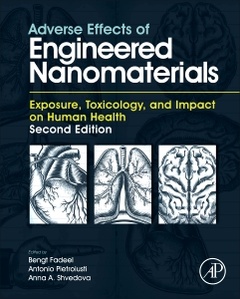Description
Adverse Effects of Engineered Nanomaterials (2nd Ed.)
Exposure, Toxicology, and Impact on Human Health
Coordinators: Fadeel Bengt, Pietroiusti Antonio, Shvedova Anna A.
Language: English
Subjects for Adverse Effects of Engineered Nanomaterials:
Keywords
agglomerates; allergy; biomarkers; biomedical applications; biomedical use; biomonitoring programs; cancer; carcinogenicity; cardiovascular disease; cellular stress; chemical; chemokines; clastogenicity; corona; cytokines; cytotoxicity; data; endocrine system; engineered nanomaterials; engineered nanomaterials (ENMs); engineered nanoparticles; ENM exposure; ENM interactions; ENM translocation; environmental protection; epigenetic mechanisms; exposure; fertility; FIFRA; food legislation; gastrointestinal tract; genotoxicity; gland; hazard; immune system; immunosuppression; in vitro; in vivo; industrial chemical; inflammation; intercellular communication; machine learning; macromolecules; medical imaging; molecular weight; molecules; mutation; nanoenabled products; nanomaterials; nanoparticles; nanotechnology; nanotoxicity; nanotoxicology; neurological system; occupational exposure; particle; physicochemical; pulmonary response; respiratory system; respiratory tract; risk assessment; ROS; Skin anatomy; statistical modeling; surface; surface concentration; surface free energy; toxicity; toxicokinetics; TSCA; tumor
486 p. · 19x23.3 cm · Hardback
Description
/li>Contents
/li>Biography
/li>Comment
/li>
Adverse Effects of Engineered Nanomaterials: Exposure, Toxicology, and Impact on Human Health, Second Edition, provides a systematic evaluation of representative engineered nanomaterials (ENM) of high volume production and their high economic importance. Each class of nanomaterials discussed includes information on what scientists, industry, regulatory agencies, and the general public need to know about nanosafety.
Written by leading international experts in nanotoxicology and nanomedicine, this book gives a comprehensive view of the health impact of ENM, focusing on their potential adverse effects in exposed workers, consumers, and patients. All chapters have been updated with new sections on the endocrine system and other organ systems. In addition, other newly added sections include introductory chapters on the physio-chemical characterization of nanomaterials and interactions between nanomaterials and biological systems, as well as a new chapter that explores risk assessment and management of nanomaterials.
This book fills an important need in terms of bridging the gap between experimental findings and human exposure to ENM, also detailing the clinical and pathological consequences of such exposure in the human population.
Section A: Engineered nanomaterials: Hazard, exposure, risk assessment 1. Bio–Nano Interactions 2. Physicochemical Characterization 3. Toxicity Tests: In Vitro and In Vivo 4. Computational Approaches 5. Exposure Assessment 6. Biomonitoring 7. Regulation and Legislation 8. Risk Assessment and Risk Management
Section B: Engineered nanomaterials: Adverse effects on human health 9. Respiratory System, Part One: Basic Mechanisms 10. Respiratory System, Part Two: Allergy and Asthma 11. Cardiovascular System 12. Neurological System 13. Immune System 14. Endocrine System 15. Skin 16. Gastrointestinal System 17. Reproduction and Development 18. Genotoxicity and Cancer
ANTONIO PIETROIUSTI received his habilitation as Associate Professor in Occupational Medicine from the Italian Ministry of Education, University and Research in 2013 and he teaches Occupational Medicine at the Faculty of Medicine and Surgery of the University of Rome Tor Vergata (English course). He is also professor of Occupational Medicine at the University “Nostra Signora del Buon Consiglio of Tirana, Albania. He is/has been member or coordinator of several national projects funded by the Italian Ministry of Health and by the Italian Ministry of Education, University and Research. He is/has been member of two Seventh Framework Program projects on nanosaf
- Uses a schematic, non-exhaustive approach to summarizes the most important research data in this field
- Discusses the health implications of experimental data in nanotoxicology
- Presents a completely revised edition that focuses on the human health impacts of engineered nanomaterials, including many organ-specific chapters




